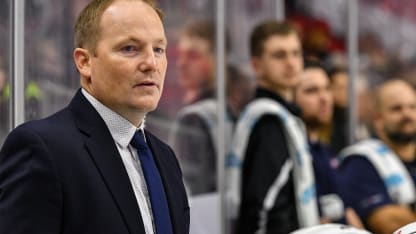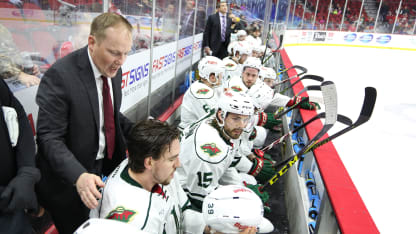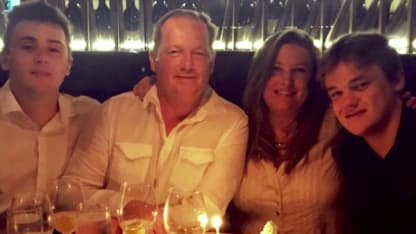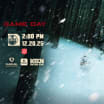DES MOINES -- David Cunniff is the first person to acknowledge that he's probably not his own best advocate.
The Iowa Wild's associate head coach doesn't have an agent, and because he hails from South Boston -- a neighborhood that treasures loyalty higher than just about anything else -- self-promotion just isn't his style.
But it is safe to say that most coaches in his position would have been gone years ago, on to some other team or out of the business entirely.
Iowa's playoff run has been years in the making for Cunniff
Associate coach has served under three different head coaches and even a stint as interim head man in four years with organization

By
Dan Myers
Wild.com
Cunniff has spent four seasons with Iowa, has worked under three head coaches and has himself served a two-month stint as the team's interim head coach.
But instead of being cast aside by every new administration that makes its way to Des Moines, Cunniff has found a way to adapt, to survive and even thrive.
For a man who values loyalty perhaps more than any other trait, he's earned it from his most important audience: his players.
"He's such a knowledgable guy and he loves the game, I think when you're sit down with him, you see that right away," said Iowa forward Colton Beck. "He's been around the league for such a long time that you want those kinds of pieces around."
Beck, the longest tenured player on the Iowa roster, arrived in Des Moines in 2015-16, Cunniff's first season as an assistant here, where he served under head coach John Torchetti.
In February of that season, Torchetti moved on to Minnesota, where he became the interim head coach for the NHL team, a move which elevated Cunniff to interim head coach in Iowa.
He inherited a team that was among the worst in the American Hockey League, but the club had its share of successes with Cunniff at the helm.
He applied for the permanent head coaching job that summer and was considered, but Minnesota's decision makers at the time, Chuck Fletcher and Brent Flahr, chose to hire Derek Lalonde instead.
Instead of pouting and leaving town, Cunniff was asked to stay on by Fletcher and Flahr, who thought Cunniff's 14 years of experience as an assistant in the AHL -- and his two months as a head coach of Iowa the year prior -- would be beneficial to Lalonde, who was coaching in the league for the first time.
"They were absolutely right. He was a home run," said Lalonde, now an assistant coach with the Tampa Bay Lightning. "He, by nature and by heart, is a development person, first and foremost. I just think that leads to success at that level."

© IowaWild.com
Cunniff, who was a forward during his playing days, has excelled coaching Iowa's defensemen. Perhaps his greatest success story during his time in Iowa has been the development of Nick Seeler, who arrived in Iowa in 2016 after three seasons of college hockey.
Seeler was big and strong, but
he was raw and temperamental
. The Wild wanted the 2011 fifth-round pick to pan out, but there was a lot of work that needed to be done to turn him into an NHL player.
Cunniff took him under his wing and spent a season and a half refining his game. On Feb. 13, 2018, less than two years after turning professional, Seeler made his NHL debut. He was so good out of the gate in a 22-game stint as a rookie that he earned himself a three-year, one-way contract last summer.
Seeler played in 71 games this past season in Minnesota and has the potential to be a fixture on the Wild's back end, this after often being a healthy scratch in Iowa just two seasons earlier.
"I still have people ask me, 'How did you get Nick Seeler to the NHL so fast?'" Lalonde said. "Seels put in the hard work, but that's 100 percent all [Cunniff] from a coaching perspective, and his attention to detail, his footwork detail, stick detail, positional detail. That's why he's had a ton of success and that's why you can win with him."
In the early part of his career, Seeler would make a mistake on the ice -- often times with it resulting in the puck ending up in his own goal -- and he would return to the bench ready to take a seat and not get up for a while.
But that's not Cunniff's style.
Instead, an encouraging word would be followed by a quick lesson in a thick Boston accent and then back over the boards he'd go. After any mistake, Cunniff is eager to get his players right back over the boards so they can learn from it.
"He really believed in me and helped me grow as a player," Seeler said. "You learn a lot fast, and you have to. If you want to continue to grow and get better as a player, you have to learn quickly. It was an eye-opener being in and out of the lineup. But with anything, you grow as you mature and get games under your belt, and I think throughout that first year in Iowa, I was able to pick out that the simpler [my game was], the better."
When Lalonde left last summer to take an assistant job with his old friend Jon Cooper in Tampa, Cunniff's name was again on the list to become the permanent head coach.
But Wild GM Paul Fenton, hired just a couple of months prior, had no prior relationship with Cunniff, which didn't help his cause.
Fenton and Iowa GM Tom Kurvers instead hired Tim Army. Once again, Cunniff was asked to stay around, and for a second time, he did.
"That would have been the easy way out for sure, but I don't think Cunny has ever done anything the easy way," Beck said. "The way he played, he's not a huge guy, so he had to fight his way to make it playing. And I don't think he'd be one to take the easy road and just say, 'Enough is enough here.' I'm sure he wasn't pumped at the time, but he put that aside.
"We've talked a lot about our group being 'we' and putting personal matters aside, and he's done that for years here."
Asked why he's so magnanimous, Cunniff just laughs.
"Maybe I should be more selfish," Cunniff says with a howl. "But I don't really have an ego. We're a tight group and we play for each other. We're all in this together and we do this together."
While Cunniff said staying on with Army and this group was a no-brainer, he did admit to feeling a little bit homesick.
His wife, Mary Ann -- who has been by Cunniff's side for more than 30 years -- and two sons, David and Patrick, all live back in Boston. Cunniff is here by himself for the entirety of the hockey season.

© David Cunniff
When Cunniff got into coaching at this level with the San Jose Sharks organization, the team had its AHL affiliate in Cleveland. The kids were young, so his entire family was with him.
After four years, the Sharks moved their affiliate to Worcester, Massachusetts, which allowed Mary Ann and the kids to return home. Cunniff would commute the hour-plus each way to Worcester, but it was an easy sacrifice to make in order to be home every night.
"I was home, I could take my kids to hockey," Cunniff said. "I spent a lot of time in the car there, but at least I was around. Or I was around as much as I could be."
When the Sharks moved their affiliate again in 2015 to San Jose, Cunniff left the team and took a job with the Albany Devils for one season, where he thought he was going to get a chance to work for Lou Lamoriello, whom he had known for most of his life.
"I thought I'd go there for a year or two and show them what I could do," Cunniff said.
But after one year with the Devils, Lamoriello was off to Toronto and the new people in charge with New Jersey chose to make some changes, leaving Cunniff without a job.
That's when he got a call from Torchetti, also a Boston native, who had known Cunniff's dad, John, from some conditioning camps he had run years earlier.
Cunniff and Torchetti had never worked together but quickly hit it off.
Still, the move to the Midwest had a big effect on his life at home. Cunniff said his biggest regret isn't a missed job opportunity or a lost game, but the fact that he's missed the entirety of Patrick's time in high school, instead pursuing his dream in the Iowa cornfields.
"I love coaching and I think I've made a difference in my players' lives," Cunniff said. "But I haven't been around for my own family. That bothers me."
Lalonde said he knows Cunniff could be a successful head coach elsewhere, and deep down, so does Cunniff. But he's never been one to parrot his own narrative.
"I got into coaching believing that if you do a good job, someone will see it and take notice," Cunniff said.
This season, Iowa has put other teams on notice, making the playoffs for the first time in the team's six-year existence. It's been a special year for everyone in the organization, but especially for coaches like Cunniff and players like Beck, who have a part of it all in their four years together.
As the seconds wound down last week in Game 5 of Iowa's first-round series in Milwaukee, Cunniff looked up at the scoreboard and raised his arms in celebration.
After the commotion on the ice had settled, Cunniff and Beck found each other and shared an embrace many years in the making.
It was a small reward for a big sacrifice.
"I'm just glad he was here when we were able to turn this thing around," Beck said. "He's a big piece of this. Obviously, when you're in the coaching business, your end goal is to become a head coach either here or in the NHL.
"I hope that day comes for him eventually. But at the same time, I hope we keep him here."
More from Iowa's Calder Cup Playoff run:
- Hammond stands tall once again in another must-win game
- Greenway plays his cards right, leads Iowa to series win
- Shaw thankful high stick didn't take any teeth
- Lengthy losing streak tested Iowa's mettle, turned its season around


















